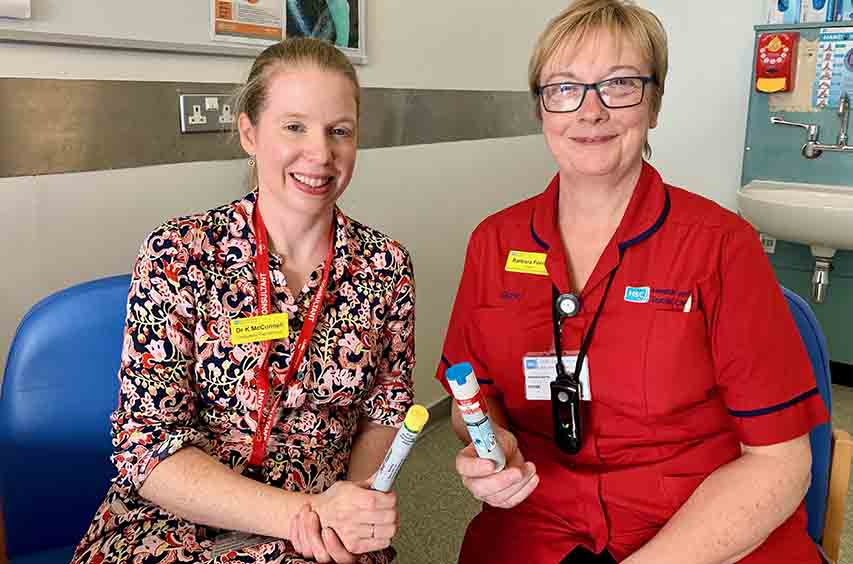The importance of recognising and treating anaphalaxis as part of Anaphyalaxis Awareness Week
‘Antihistamine treats hives, and adrenalin saves lives.‘
Anaphylaxis can be a life-threatening condition and parents are advised to get to grips in recognising the symptoms and how to react if it
“It is really important that children and young people realise that you can live a normal life living with allergies,” said Joint Lead Consultant for Paediatric Allergy Service at the Ulster Hospital, Dr Katy McConnell who lives with and manages a severe allergy to nuts.
Highlighting Anaphylaxis Awareness Week, Dr McConnell explained how important it is to recognise the signs of anaphylaxis, how to treat it and not to hesitate if you think you or your child needs their adrenaline, ‘Epi Pen or JEXT pen’.
Anaphylaxis is a severe, life-threatening allergic reaction.
It can happen seconds or minutes after you’ve been exposed to something you’re allergic to.
Peanuts or bee stings are examples. In anaphylaxis, the immune system releases a flood of chemicals that can cause the body to go into shock.
The most widely reported triggers of anaphylaxis are:
· Peanuts and tree nuts
· Other types of foods such as milk, egg, sesame and seafood
· Insect stings – particularly wasp and bee stings
· Certain medicines such as antibiotics

Dr McConnell highlighted her anaphylaxis journey and added: “As a fellow allergy sufferer with anaphylaxis to nuts I understand the burden that it can have on a young person and adult.
“I was around seven years of age when I went to a birthday party and I accidentally ate a bun which contained peanut, I had only a small crumb of it and immediately developed hives, an itchy throat and breathing difficulty.”
Dr McConnell added, “It is so important to recognise these signs and not hesitate if you think you or our child needs their adrenaline pen.
“Later on in life I did experience another instance of anaphylaxis and at the time I did feel embarrassed that I had accidentally eaten something with nuts in it.
“I tried to play down my symptoms and I got quite wheezy and needed the Epi Pen.”
Dr McConnell stated how she and her family and friends, “Do live a normal life, we go out for dinner, coffee, but I am very careful and always read the ingredient lists.
Also, Dr McConnell added how, along with her everyday staples in her handbag, she said: “I always carry my Epi Pen and my antihistamines. I want children to enjoy life and not feel excluded just because they have a life-threatening allergy.”
She stressed the importance of recognising the signs of anaphylaxis. “As parents it is important to recognise the symptoms such as breathing difficulty, tongue swelling and level of consciousness.
“If you need to give the adrenaline pen, my advice to any parent is don’t be afraid to administer it.
“I can’t emphasise or put across enough how adrenaline saves lives.
“I always use the mantra when it comes to how to give the pen correctly, ‘blue to the sky, orange to the thigh’. The advice is to carry two pens at all times as there are times when you may need another.
“It is important that friends and families are shown how to use the adrenaline pens.
“My school was always very helpful and it was a comfort for me to know that when I was out in a group of people there was always somebody there who knew how to give my Epi Pen if I needed their help.
“There have been many advances in allergy and prevention is now so important with the early introduction of egg and peanut. When I was a child, the advice was not to introduce these foods early.
“We now know that they should be introduced early to prevent allergy and I have done this with my own children.
“The most important message is to know when and how to give adrenaline by recognising the signs and symptoms of anaphylaxis. Rates of anaphylaxis have risen but rates of death have not.”























